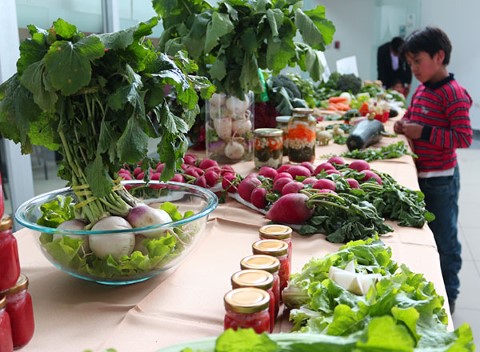- Team Impact
- Guatemala

Every other morning, Ana, a volunteer mother, heads to the Francisco Huarcay garden near a Children International community center in Quito, Ecuador. Today, she works the loose, fertile soil around a massive green-and-purple cabbage. Nearby, other parents pull weeds while children giggle and play as they water the crops.
This garden – just one of 13 located in conjunction with CI’s community centers in Quito – produces enough organic vegetables to feed 10 families and then some. Parents sell the leftover crops at nutrition fairs in the centers, fostering an entrepreneurial spirit and providing supplemental income.
But the gardens have yielded even more benefits than food and money. Ana notices how the work has brought the community together. She sees the physical activity engaging adults and youth as they dig and work the plots. Most importantly, she is pleased to see a shift in how the children perceive healthy foods.
“Today, my children love to eat salads and healthy food containing vegetables,” Ana said. “Before, they had bad eating habits. Now, they like when I cook corn or delicious veggie lasagna.”

A mother and daughter harvest organic Swiss chard from the El Duraznito community garden.
The Community Vegetable Garden Project began last summer at the El Transito community center as an experiment in healthy eating after center staff began to notice an uptick in child-obesity rates. The reasons for the increases vary. A primary one is a lack of knowledge about nutrition, which can lead to parents making poor food choices for their families. Other times, children are unduly influenced by TV advertising of fast food and snack foods. In addition, nutritious food isn’t always readily available nor is it as inexpensive as processed food.
The doctors at the El Transito center hope the community gardens will help address many of these issues and encourage participants to eat healthier meals with the food they harvest themselves. So the doctors sowed a few seeds in a small backyard and, thanks to the rich soil and ideal weather, the vegetables flourished. Families were eager to begin their own community gardens.

Children and families visit community centers to shop for fresh, organic vegetables grown in the community gardens.
Children International partnered with CONQUITO, the city’s economic department, to provide organic farming training to 112 adult participants. Individual groups received a full set of tools, a plot of land and seeds. Less than a year later, families began seeing the fruits of their labor: onions, cauliflower, radishes, lettuce, celeries, corn, carrots, potatoes, turnips, broccoli, cabbages and herbs.
CONQUITO representatives have continued to provide nutrition workshops, teaching participants how to create organic pesticides, prepare dishes and snacks using the foods from the garden, make jam and dried fruit, breed guinea pigs (a common meat in the region) and raise hens. And, thanks to the wild success of the Quito program, other centers around the world have begun similar initiatives. CI staff in Jalisco, Mexico, for example, also have begun educating families about how to plant and maintain gardens.
Together, Children International and local communities are working together toward a common goal of boosting children’s and youth’s health and preventing malnutrition.
Marjorie, Ana’s 14-year-old daughter, echoes the sentiments of many other youth and children in her neighborhood. “I did not like vegetables before, but now I see my family eating salads, and I started to like them too,” she said. “Now, I like to eat a lot of corn and potatoes because they are delicious and because they come from our garden.”